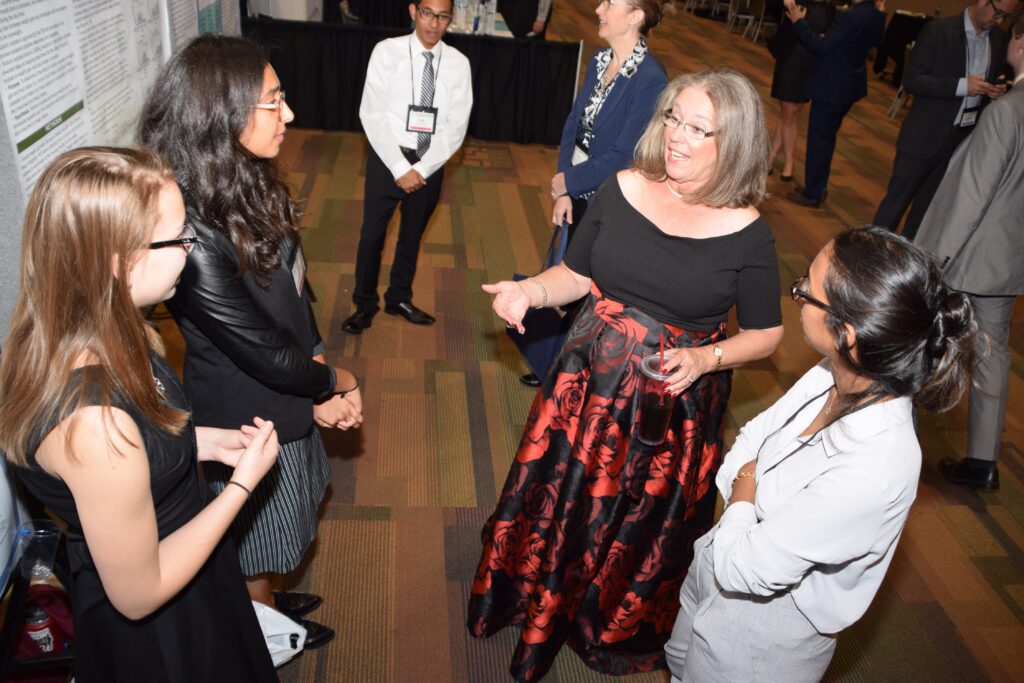
Advancing from the Classroom to Careers
AZAdvances Talent™ is a statewide pilot program designed to develop the next generation of bioscience and healthcare leaders.
Educators in our high schools, community colleges and universities provide our students with the essential foundations that they will use to in their future careers. Internships at life science an healthcare organizations provide a framework in the form of real-world experience. Students can apply what they have learned and explore how what they are learning leads to their future career paths and options.
AZAdvances Talent programs are designed to help talented Arizona Students explore and prepare for careers in the life science and healthcare sectors. The program has three components: Connections, Internships, and Scholarships.
AZAdvances Talent programs provide added impact by making these opportunities equally available to all students and designing programs so that they are inclusive, accessible, and add value to student’s learning experience.
Please see the FAQs at the bottom of this page for more information on the costs and support opportunities for individual programs.

Connections
Over the last 10 years’ OTEF’s D3Bio program has provided over 1,400 Arizona high school, community college, and and university students to interact with industry leaders in the AZBio Student Discovery Zone. Students apply to participate by submitting a description of their life science research project and a short video explaining their work. Industry and academic scientists judge the applications and invte qualified students to the Student Discovery Zone. In addition to making valuable connections, the students compete for scholarship prizes.

Internships
The ability to obtain real-word experience by working as an intern within a company helps students explore career paths, strengthen their educational applications, and build their resume. Unfortunately Arizona has more students aspiring to internships than we have internship opportunities. To address this challenge, AZAdvances Talent Interns are hired by OTEF, mentored by AZAdvances staff on how to make the most of their internship experience, and then placed with local life science companies in a structured program designed to optimize both the intern’s and the mentor’s experience. By ensuring that all interns have access to paid positions, this program also addresses a significant equity barrier that many students face today.

Scholarships
Today, Student Discovery Zone Scholarships reward students based on the level technical merit awarded in our research competition. Additional scholarship competitions will be co-created with our donors based on measurable goals and objectives. Scholarships are designated for candidates for a degree at an eligible Arizona based educational institution. In accordance with IRS guidelines, scholarship proceeds may be applied to payments for tuition and fees required for enrollment or attendance at the eligible educational institution, and course-related expenses, such as fees, books, supplies, and equipment required of all students for the courses of instruction at the eligible educational institution.
Inclusion, Access, and Impact
The following actions are designed to focus on key metrics related to inclusion, access, and impact.
Inclusion
Inclusion begins with building awareness of opportunities across Arizona’s with our educators and student populations. Building awareness is not a passive activity. It requires proactive outreach, education, and actively listening to identify the goals of the students and their barriers to reaching these goals. Once barriers are identified, creative solutions can be developed to address them.
Access
Some barriers are already known. Socioeconomic status can be a limiting factor for students when internships are unpaid . For this reason, all interns will be paid at a reasonable rate at or above minimum wage rates in their community based on their skill and education level. But, pay may not be the only limiting factor. Lack of transportation, housing near a internship posting, or basic employment skills can also be limiting factors. Addressing these challenges must also be considered if programs are truly inclusive.
The number of available paid internship positions is a known limitation. By educating Arizona life science businesses on how to appropriately structure the intern experience and providing paid interns to them, we can open up more internship opportunities for our students.
Impact
Developing the talents of our future workforce and measuring the impact of the program is not a short term activity. It requires attention to both short term metrics and long term impact.
Short Term Metrics:
# of Educational Outreach Activities
# of company internship opportunities created and filled
# of company internships successfully completed
Demographics of students placed in internships
Demographics of students successfully competing internships
# of scholarships available
Demographics of scholarships awarded
Long Term Impact:
# of program participants reaching their stated educational goals
# of program participants hired by Arizona companies
# of program participants who continued their career journey in Arizona
Demographics based on Educational Attainment
Demographics based on career pathways
Note: The AZAdvances Talent team will continue to seek insights from program participants as they progress throughout their career pathways for as long as the program participant is willing to engage.
Frequently Asked Questions
Please click on a question to learn more. Don’t see your question? Please contact us.
Student Discovery Zone $20K per year. Includes: program coordination and outreach, program materials, tickets to the AZBio Awards for students, educators and/or chaperones, and scholarship prizes. (This is an ongoing program – support opportunities are currently available ranging from $1,000 to 20,000.)
Internship Program (cost varies based on number of internship positions) Includes: intern wages and employment costs, liability and workman’s comp insurance, background checks as may be needed based on intern age, and accommodations if required. Internship costs are based on a schedule of 16 weeks at 20 hours per week. Estimates below are fully loaded per intern and do not include the outreach and administration costs below.
- High School and Undergraduate $6,750 per internship
- Graduate Students $10,800 per internship
Estimated cost for 10 interns in each category. $175,500
Estimated cost for 20 interns in each category. $351,000
Scholarships are key to supporting students in reaching their educational and career goals. Scholarship opportunities may be sponsored at any time by either designated donations to the AZAdvances Today fund or via distributions from an AZAdvances Legacy Endowment. Examples of scholarship programs may include but are not limited to:
- Scholarships for first-generation college students studying in the health and life sciences.
- Scholarships for students who have successfully completed an internship assignment
The details of specific scholarship offerings will be co-developed with the donor and in accordance with IRS requirements.
Outreach and Administration $200K per year. Includes: Staff (2 FTE) , travel expenses, program materials and educational resources, mentor training, databases for tracking of key performance metrics, and other administrative costs.
Yes. Internship and Scholarship programs are limited to students living in the State of Arizona.
To discuss programs focused on specific geographies within Arizona, please contact us.
Yes. Once an intern is selected for the program, the intern will go through OTEF’s hiring process and be considered a part time, temporary employee for the term of the internship. All wages will be reported and taxes will be withheld. The intern will receive a W-2.
In accordance with IRS guidelines, scholarships, prizes, or other non-employee compensation in excess of $600 in any tax year will be reported on form 1099-misc. It is the responsibility of the student to keep records of their eligible offsetting educational expenses.
